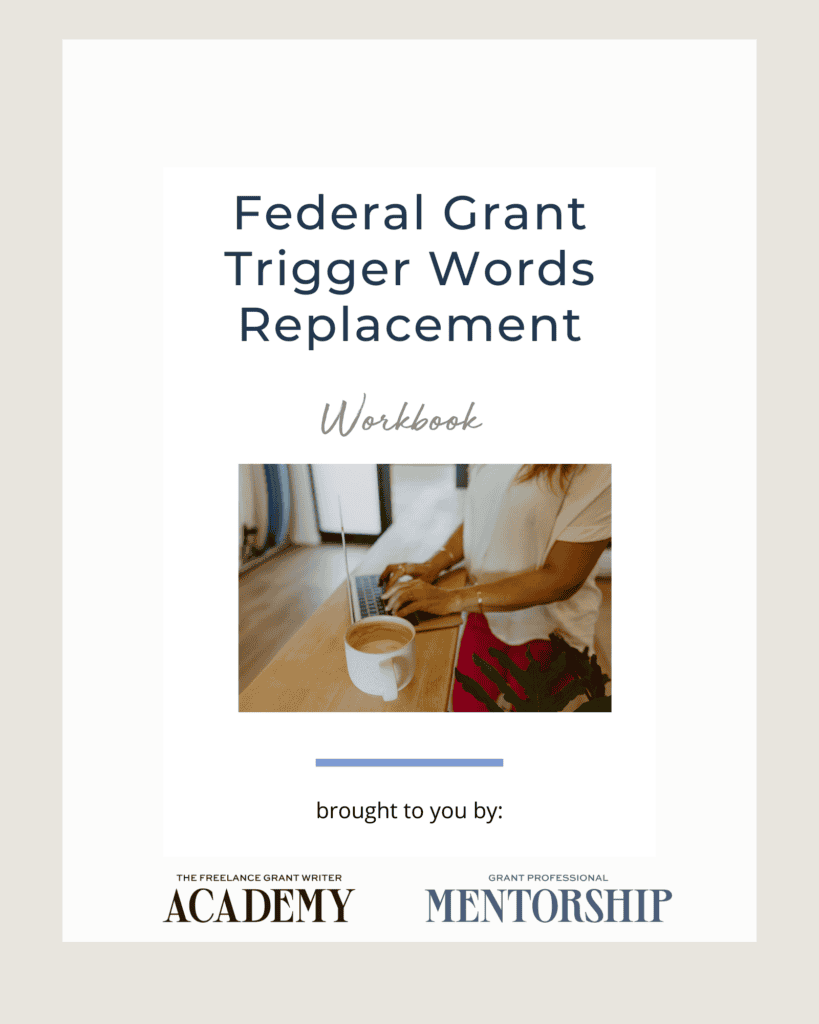**NEW – CLICK HERE If you are looking for How to Replace “Trigger” Words in Federal Grant From the Trump Administration in 2025, click here to see a list of How to Replace Trigger Words.
There are certain words and things that you should NOT include in your grant proposals! I often teach about what to DO in your grant writing (such as the Master Grant Template in the Freelance Grant Writer Academy), but I haven’t really said, “Don’t do this!”
Therefore, this episode is dedicated to what NOT to do in your grant writing.
#1 Don’t Use Ambiguous Language
Avoid using ambiguous language when writing. One thing every grant reviewer needs to see is specific language. If you use ambiguous or broad language, there are no specific deliverables!
Example of words NOT to use:
- Lack of
- Too few
- Not enough
- Misc.
- Etcetera
Instead use:
If there is a lack, what is the lack? None? Only two?
For example, “County A does not have a homeless shelter for at-risk youth. However, Report Youth stated that there are 250 homeless at-risk youth in County A (2022).”
Use the above example instead of saying “Country A has a lack of homeless shelters.”
#2: Don’t Use the Word Very or Rarely
Using the words very or rarely are also ambiguous. The program is very much needed, doesn’t give me any specifics.
As in the above example, use statistics or numbers to demonstrate instead of the word very or rarely.
#3 Don’t Use Emotional Language
As a federal grant reviewer, I see emotional language used all the time to try to pull at my heartstrings. The thing is, there isn’t a score for how your heart hurts for a program. Nope.
Once again use statistics, reports, testimonials, and specifics to show how bad the situation is. That will tell an emotional story.
Then show me how the program will provide a solution with (yep, you guessed it) specific outputs.
#4 Don’t Use Poetic Language
Don’t use poetry and prose when writing a grant proposal. This can be distracting and also will not be responding to the criteria!
This type of language is more appropriate for fundraising copy or crowdfunding copy.
#5 Don’t Use Academic Language
What I mean by ‘academic’ language is trying to use humongous (big) words to make you sound more intelligent. Write to an 8th or 9th grade level, just as a newspaper article would read.
#6 Don’t Use Too Much Scientific Language
Sure, for certain grant proposals you may use scientific language that is very well known in that specific field. If you are writing a NOAA grant or an NIH grant, you will get scientific language in there!
But in general don’t make the grant proposal too nerdy. The thing is you may get reviewers from your greater field of study and they may not know all the specifics of your niche field. So if you do use scientific language, also briefly describe it.
There you have it! Those are some tips on what NOT to do when writing grant proposals!
**NEW – CLICK HERE If you are looking for How to Replace “Trigger” Words in Federal Grant From the Trump Administration in 2025, click here to see a list of How to Replace Trigger Words.

